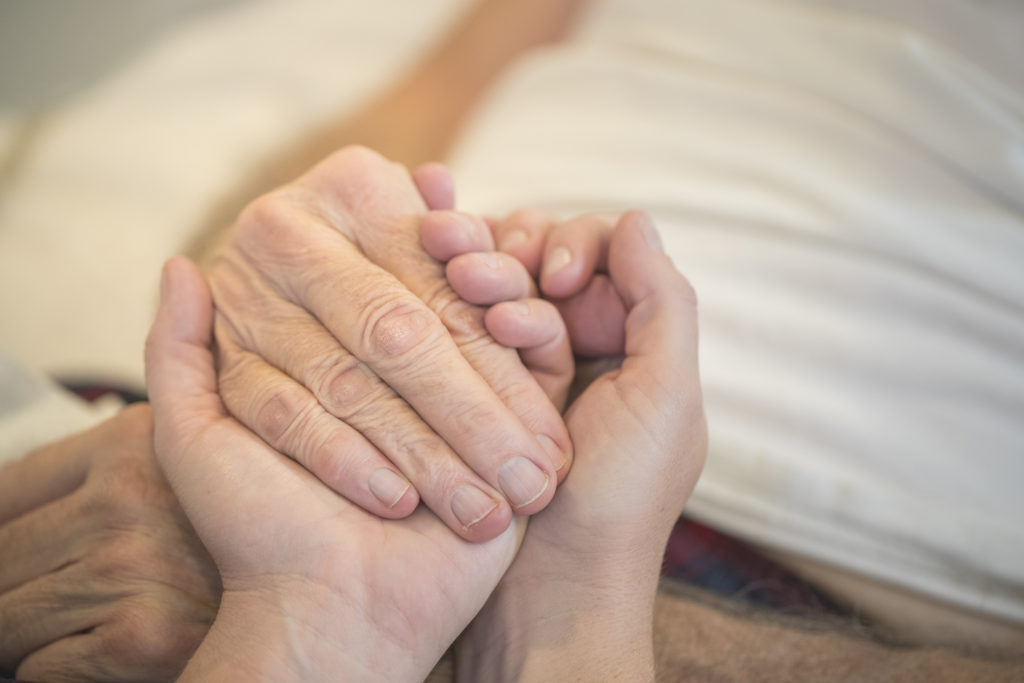Sharon Wilton was apprehensive as she walked into the adult family home in early June. She didn’t know anything about the elderly man she was going to visit, except that he was in the final hours of his life.
The man was unresponsive. His breathing was rattled, his eyes partially open.
For four hours, Wilton sat beside the stranger. She talked to him. Played music. Held his hand.
By the end of her volunteer shift, the nervousness, the uncertainty had faded and Wilton felt a sense of peace.
“I felt a little uncomfortable at first,” Wilton admitted. “But the longer I sat there, it was OK.”
“When you put your hand in their hand, it was like human contact and it was OK,” she said.
Wilton was one of the first volunteers to sit with a dying patient as part of a new program, No One Dies Alone, offered by Hospice Southwest.
The mission of the program is simple: Ensure that nobody dies alone. And volunteers such as Wilton make that possible by spending four-hour shifts with people in the final 24 to 48 hours of their lives.
“What they’re doing is, they’re creating a sacred space for this individual,” said Colleen Storey, bereavement counselor at Hospice Southwest. “They’re just holding that space so this individual does not die alone.”
No One Dies Alone was started by a critical care nurse at Sacred Heart Medical Center in Eugene, Ore. The nurse, Sandra Clarke, was asked by a dying patient to sit with him. She had rounds to do, other patients to check on, so she told the man she would return as soon as she could. When she returned an hour and a half later, the man was dead.
“It impacted her big time,” Storey said. “That he asked her to stay and she couldn’t and he died alone.”
As a result, the Eugene PeaceHealth hospital launched the volunteer program in November 2001. And today, the program — in some variation — is available across the world, Storey said.
In April, Hospice Southwest put out a call for volunteers to start the program in Vancouver. Thirty-six people attended the daylong training in May. The training taught volunteers about the process of dying and things they can expect to encounter as they sit with patients.
The class also explained the role of volunteers: to be a calming presence, not to provide any sort of medical care. The participants talked about their own death-bed scene — how would they want their final days to look — and role-played situations they may encounter.
All volunteers are subject to a background check and are offered services from bereavement counselors, Storey said.
Currently, the program is open to anyone who is alone and receiving hospice services from Hospice Southwest. But Storey said she hopes to see the program expand community-wide as its volunteer base grows.
Storey is planning another volunteer training in August, though details haven’t been finalized yet.
By the end of the May training, Wilton felt as prepared as she felt possible given the circumstances of the program. Within days of the program launch on June 1, Wilton was called to sit with the first patient. Last weekend, she was called again. This time, to sit with a man in his 40s who was dying alone.
Before his death, the man filled out a form about himself and his end-of-life wishes. Armed with that, Wilton and the other volunteers knew what the man did for a living, where he came from, that he had a sense of humor and that he was Christian. One volunteer read scripture to the man. During Wilton’s shift, she read from a book, “The Art of Being a Healing Presence.”
The day after Wilton’s volunteer shift, she called to see if the man had passed. He had, but Wilton felt at peace with his death.
“When you walk away from it, you feel good about being there for someone else,” she said. “It’s very rewarding.”




